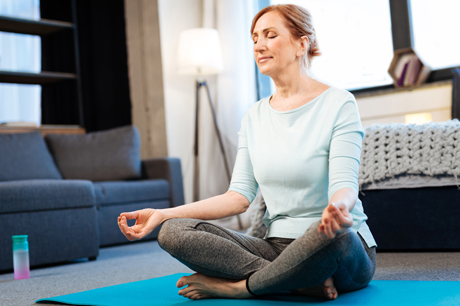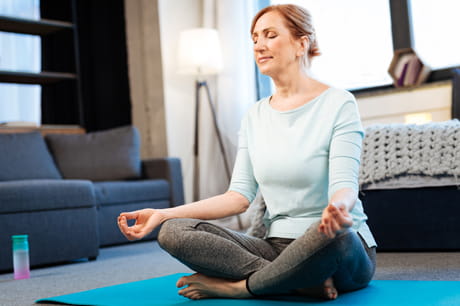5 health benefits of yoga backed by research
Thinking about adding yoga to your fitness routine, but feeling skeptical? Here are 5 research-based benefits to starting up a yoga practice.
In today’s busy, fast-paced world, yoga has grown in popularity — not only for its physical benefits, like increased strength and flexibility, but for its ability to boost mental health and improve well-being.
While not for everyone, many who practice yoga would agree that its holistic nature (think body and mind) provides a retreat from life’s stressors.
But what else can yoga do for us? Many research studies have confirmed that it’s beneficial physically and mentally, but is it just as good for us as other forms of exercise? The answer might surprise you.
Michelle Smith, director of Geisinger’s House of Care in Danville, certified yoga instructor and yoga therapist, helps us understand the benefits of yoga and why it may be a good idea to give it a try.
What is yoga?
Yoga is an ancient practice that focuses on connecting the mind and body through physical postures (or poses), breathing techniques and meditation.
Considered a low-impact exercise, it’s safe for nearly anyone, especially when guided by a well-trained instructor who can correct your alignment or modify poses to help keep you safe and comfortable.
“There are many types of yoga. Some are more physical while others are more still and meditative,” explains Ms. Smith. “The goal when practicing yoga is to challenge yourself physically (but not too much), while focusing on your breath and calming your mind.”
In fact, yoga helps turn your focus inward, enhancing your awareness of what’s going on inside your body and even boosting self-esteem. “This is why we see yoga becoming an integral part of treatment programs for eating disorders, addiction and more,” adds Ms. Smith.
Let’s take a look at a few more benefits of yoga that are backed by research.
5 health benefits of yoga
From relieving stress and anxiety to reducing inflammation in the body, here are a few benefits of practicing yoga that have been studied by researchers:
1. It can decrease symptoms of stress, anxiety and depression
Studies have shown that yoga can decrease the secretion of cortisol, often called the stress hormone, which can reduce stress.
Cortisol can influence the levels of serotonin, a neurotransmitter associated with depression, leading some researchers to conclude that yoga may even help decrease the symptoms of depression.
It’s also been shown that yoga can help relieve symptoms of anxiety through strategies like focusing on the present moment and finding a sense of calm.
However: “It’s important to note that while yoga can help decrease the symptoms of these conditions, it should never replace traditional medical care when it’s needed,” says Ms. Smith.
2. It can help reduce chronic pain
Chronic pain is pain that can last from weeks to years and can affect people physically and mentally. Yoga can be helpful for those suffering from chronic pain like arthritis and migraines and has been especially promising in relieving lower back pain.
“Several studies have shown that yoga can help reduce pain and improve physical function,” says Ms. Smith. “Of course, you’ll want to work with a trained instructor who can modify poses for your specific limitations.”
Living with chronic pain? Learn more about our multidisciplinary pain management program.
3. It can reduce inflammation in the body
While some inflammation is helpful — it’s how our immune system alerts our body that there’s something going on — chronic inflammation causes pain and fatigue. It’s also linked to diseases like diabetes, cardiovascular disease and cancer.
Things like being inactive, overweight, and eating a poor diet can cause chronic inflammation. The good news? Making some lifestyle changes, such as adding anti-inflammatory foods to your diet and practicing yoga may help.
Several studies have shown that yoga is particularly helpful in reducing harmful inflammation in the body.
4. It can help improve the quality of life
More and more, yoga is being used in conjunction with other treatments for certain conditions. Particularly, it’s been shown to improve quality of life and reduce symptoms in people with cancer.
Research studies have shown that people undergoing breast cancer treatment who practiced yoga were able to decrease symptoms of chemotherapy, such as nausea and vomiting, while also lowering their stress, anxiety and depression.
“Yoga has been shown to improve sleep quality, enhance spiritual well-being and reduce anxiety and depression,” explains Ms. Smith. “For someone living with pain, sleep issues and anxiety, this practice can vastly improve their quality of life.”
5. It can encourage mindful eating
Since yoga encourages people to practice mindfulness, which means focusing your attention on the present moment, it’s also been shown to promote healthy eating habits.
Because yoga helps build awareness of how your body is feeling, it can carry over to mealtime through mindful eating as you notice the taste, texture and smell of your food and how it makes you feel.
Some studies have shown that when paired with traditional treatments for eating disorders, practicing yoga and mindful eating helped to reduce eating disorder symptoms and preoccupation with food.
As with any new exercise program, if you’re thinking of trying yoga, be sure to talk to your doctor first. “Yoga doesn’t replace traditional medicine — it complements it,” says Ms. Smith. “And for many, it can truly make a huge difference.”
About House of Care
The House of Care is a low-cost lodging option on Geisinger Medical Center’s campus in Danville, Pa., where patients who are undergoing extensive treatments at the hospital may stay to help reduce time spent traveling. Those staying at The House of Care can also explore modalities of integrative medicine, like yoga therapy, with the help of compassionate, knowledgeable staff.
Next steps:
Learn about cancer care at Geisinger
Living with pain? Our multidisciplinary pain management program can help.
Need a pick-me-up? Here are 8 ways to improve your mental health.





